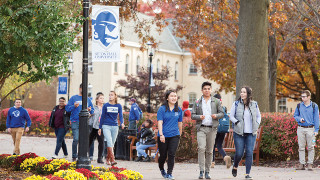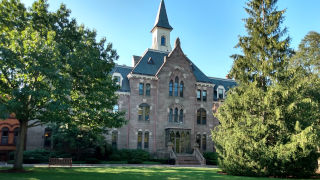Dual Degrees and Graduate Programs at Seton Hall
While you are still a Seton Hall undergraduate, consider pursuing a dual degree or
graduate program at the University.
Why? A graduate degree that diversifies and complements the skills learned in your
undergraduate programs will increase your ability to adapt to changing job markets,
technologies and economic trends, as well as prepare you to be a lifelong learner.

By pairing undergraduate and graduate coursework and degrees in different fields beyond developing skills specific to a single discipline or profession, you will be more versatile and distinct from other job applicants. A dual degree can also allow you to couple your passion with practicality, infusing your career path with a lifelong interest.
Consider Saving Time and Money
(and Earning More!)
Dual degrees often count as many as four courses for both undergraduate and graduate credit, effectively giving you 24 credits for the price of 12*. While the specifics vary by program, all of the dual degrees are cheaper and faster than earning your undergraduate and graduate degrees separately.
If affordability is a concern, Seton Hall offers an array of financial support. In addition to full and partial graduate assistantships, the University offers a variety of generous scholarships for accepted graduate students. Learn more about financial aid and scholarship opportunities.
* Credits vary by program; consult the University course catalogue and/or contact a faculty member for details.
Keep an Open Mind
Your undergraduate major generally does not limit what kinds of graduate programs you can pursue. The University has dual-degree arrangements and graduate admissions criteria that enable students to articulate many different degrees across fields, disciplines and colleges. In fact, many graduate programs seek candidates with undergraduate majors that differ widely from the specific graduate field. So, keep an open mind and explore the nearly 90 graduate degree opportunities at Seton Hall. Do not assume you are unfit for any graduate degree without first speaking with a faculty member in the program.
Many of the support services that are available to undergraduate students at Seton Hall — including Counseling and Psychological Services, the Writing Center, Health Services, Academic Resource Center and the Career Center — are still available to graduate students. You will also still have access to the library, 24/7 tech support and the fitness center.
Consider what a master’s degree can do for you!
$62,000
Average annual salary compared to $48,000 for those with a bachelor’s*
3 Percent
Unemployment rate compared to 5 percent for those with a bachelor’s*
8 Percent
Americans holding this advanced degree**
* www.bls.gov
** www.statista.com






